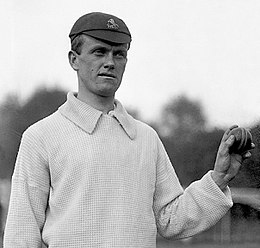On this day, the 30 May, 1879, English cricketer, Colin Blythe, was born in Deptford. The eldest of 13 children, 7 boys and 6 girls, 12 of which survived infancy. When he was nearly 13, the statutory minimum age for leaving school at the time, as the growing family needing an extra breadwinner.
Blythe was an outstanding slow left-arm orthodox bowler, and right-handed batsman for Kent, from 1899 to 1914. He also played in 19 Test matches for England [1901-1910].

Blythe numbers among just a few players to have taken 2,000 wickets in a first-class career, and shares the world record for the highest number of first-class wickets [17] taken in a single day of play.
It is said in his teenage years, Blythe played both cricket and football on Blackheath, as a member of a boys’ club team, and village cricket.
In 1897, Blythe attended a trial with Kent, at the renowned ‘Tonbridge nursery’, a renowned training centre for young players. He was successful and engaged by Kent as a trainee bowler.
In July 1898, Blythe made his début for Kent’s Second XI against Sussex Second XI, at the Clnty Cricket Ground in Hove, which Kent lost by 8 wickets. In August, 1898 he made his first-class debut for Kent in a County Championship match against the Championship favourites Yorkshire, which Kent surprisingly won by 8 wickets.
In his career, Blyth played in a combined total of 458 Test and first-class matches, scoring 4,661 runs, with no centuries, his top score being 82 not out. He took 2,606 wickets in all, including a haul of 10 wickets in a match on 75 occasions, his best figures being 10 for 30.
Despite suffering from epilepsy, Blythe enlisted in the armed forces at the outbreak World War 1, and was killed in the Battle of Passchendaele in 1917.
30 May, 2019